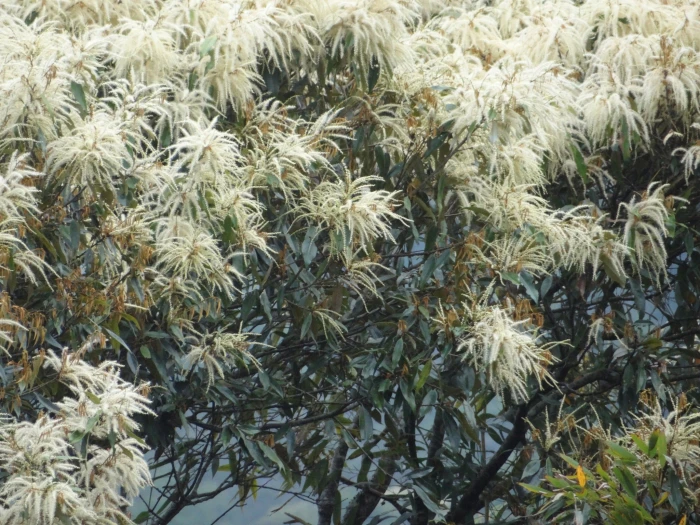Farges’ Chestnut
(Castanopsis fargesii)
Farges’ Chestnut (Castanopsis fargesii)
/
/

呂一起(Lu i-chi)
CC BY 4.0
Image By:
呂一起(Lu i-chi)
Recorded By:
Copyright:
CC BY 4.0
Copyright Notice:
Photo by: 呂一起(Lu i-chi) | License Type: CC BY 4.0 | License URL: http://creativecommons.org/licenses/by/4.0/ | Rights Holder: 呂一起(Lu i-chi) | Publisher: iNaturalist | Date Created: 2023-04-30T16:55:06-07:00 |

























Estimated Native Range
Climate Requirements for Chengdu, China
| This Plant | Your Site | Plant Suitability for Your Location | ||
|---|---|---|---|---|
| • Precipitation | 16" - 131" | 38" | Aquatic | Aquatic |
| • High Temp. | 65°F - 94°F | 86°F | Your summer temperatures are normal for this plant. | Excellent |
| • Low Temp. | -12°F - 64°F | 37°F | Your winter temperatures are normal for this plant | Excellent |
This plant should grow well at your location with about N inches per year (Y minutes per month) of irrigation.
Summary
Castanopsis fargesii, commonly known as Farges’ chestnut, is an evergreen tree native to the diverse broad-leaved evergreen forests of China and Taiwan, particularly in regions such as Anhui, Fujian, Guangdong, Guangxi, Guizhou, Hubei, Hunan, Jiangsu, Jiangxi, Sichuan, Taiwan, Yunnan, and Zhejiang, thriving at elevations of 656-6,889 feet. This species typically grows to a height of 33-98 feet tall and is recognized for its dense, rounded canopy and glossy, leathery leaves that contribute to its lush appearance.
Farges’ chestnut is valued for its high-quality edible nuts, which are a food source for local wildlife and humans alike. The tree’s bark can be used to produce dye, and its hardwood is sought after for construction and fine cabinetry. In cultivation, it is often used as a shade tree or ornamental specimen in large gardens and parks. It prefers well-drained, acidic to neutral soils and can tolerate a range of light conditions from full sun to part shade. While it is relatively low-maintenance, it may be susceptible to chestnut blight, which can be a serious problem in some areas.CC BY-SA 4.0
Farges’ chestnut is valued for its high-quality edible nuts, which are a food source for local wildlife and humans alike. The tree’s bark can be used to produce dye, and its hardwood is sought after for construction and fine cabinetry. In cultivation, it is often used as a shade tree or ornamental specimen in large gardens and parks. It prefers well-drained, acidic to neutral soils and can tolerate a range of light conditions from full sun to part shade. While it is relatively low-maintenance, it may be susceptible to chestnut blight, which can be a serious problem in some areas.CC BY-SA 4.0
Plant Description
- Plant Type: Tree
- Height: 25-35 feet
- Width: 20-40 feet
- Growth Rate: Moderate
- Flower Color: Yellow
- Flowering Season: Spring, Summer
- Leaf Retention: Evergreen
Growth Requirements
- Sun: Full Sun, Part Shade
- Water: Medium
- Drainage: Medium, Fast
Common Uses
Low Maintenance
Natural Habitat
native to the diverse broad-leaved evergreen forests of China and Taiwan
Other Names
Common Names: Farges’ chinquapin, Farges chestnut
Scientific Names: Castanopsis fargesii, Castanopsis argyracantha, Castanopsis taiwaniana, Pasania ischnostachya
GBIF Accepted Name: Castanopsis fargesii